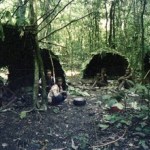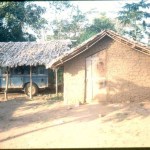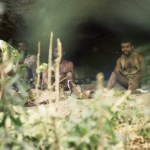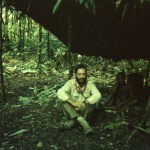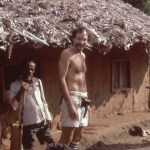lost congo memoir
“First, we’re going to collect our data,” Jack, the archaeologist, was telling me as we slogged down the narrow overgrown path. He seemed annoyed. “Then, we’ll leave. Until we leave, they won’t leave. They think it would be rude. After they leave, we’ll go back and map in the abandoned camp.”
I had just arrived at the research camp in the Ituri Forest, then Zaire and now the Congo, after a rather long and harrowing journey that took me from Boston to New York to London to Lagos to Kinshasa to Kisingani to Isiro, all by plane, then over 250 kilometers of increasingly less road-like road, to…
At the beginning of the 20th century, a traveler in Central Africa made mention of some strange people that he had come across. He was traveling among regular, run-of-the-mill natives…probably Bantu-speaking people living in scattered villages and farming for their food. But along the way, strange people came out of the forest. These strange people had sloping foreheads; they were short of stature, bow-legged and otherwise misshapen. They also clearly were, in the eyes of the traveler, of subhuman intelligence. The traveler described these people as a separate, subhuman race that lived in the…
I first became aware of, and read, King Leopold's Soliloquy, which is not his soliloquy but a parody of what he might say according to Samuel Clemens, while doing fieldwork in the ex-Belgian Congo. That is where the real story that inspired the essay took place. I lived in an area that at one time had a few a plantations, but the plantations only existed briefly and are now long gone. The "road" through this area was passable only with a very tenacious four wheel drive vehicle (we had a Land Rover) and grew worse every year. But the road at one time was excellent.
I knew a guy, an older…
We were talking about insects, and eating insects, and this reminded me of something funny. I was traveling in the most remote part of Central Africa, several days walk from any place you could possibly drive a car, visiting uncharted villages mainly occupied by people who had moved into the deep forest because they were in trouble with the "law" in some way (usually for perfectly good reasons in this lawless country). I was traveling with a Lese Villager and his sister, who was hired as our cook, and three Efe Pygmy men. We visited a village that was not exactly uncharted, but which…
We were discussing insects. What about eating insects?
When it comes up that I've lived in the Central African Rain Forest, certain questions often come up, and one of them is: "Did you eat bugs?"
Every one has seen those National Geographic specials where some natives somewhere are eating insects, and of course, Westerners who think they generally don't eat insects are fascinated with the idea. However, Westerners eat a lot more insects than they think. You should really consider any processed food you eat that started out as a plant crop to be part insect. If what you are eating is…
I knew a couple who had spent a lot of time in the Congo in the 1950s. He was doing primatology, and she was the wife of the primatologist. And when she spoke of the Congo or Uganda, where they spent most of the time, she always said "The thing about Africa is that there's no place to sit down."
Now, I've been all over Africa, and I've sat down in Nigeria, Kenya, Lesotho, Botswana. I admit having had a hard time finding a place to sit down in Namibia but that's because I've only been in places with no chairs but there were a lot of rocks. I once sat for a long time on a curb in Rwanda.…
Acupuncture is the ancient East Asian practice of poking people with needles in specific places and in specific ways in order to produce any one of a very wide range of results that could generally be classified as medicinal or health related. I don't know much about it, but Wikipedia tells us:
Its general theory is based on the premise that bodily functions are regulated by the flow of an energy-like entity called qi. Acupuncture aims to correct imbalances in the flow of qi by stimulation of anatomical locations on or under the skin called acupuncture points, most of which are connected by…
I remember my first solar eclipse. I was a kid, and it was the one Carlie Simon sang about, in March 1970.
(The eclipse reference is just past three minutes. Some other time we can argue over whether or not Carlie, singing in this video on Martha's Vineyard, was referring to the March 1970 eclipse or the July 1972 eclipse, but I'm sure it was the former, because that's the one everybody got all excited about.)
I was such a geek that I actually missed the eclipse because I was busy collecting data. There was a phone number you could call and a lady's voice would give you the time and…
As an archaeologist, my expertise in the cognate field of geology includes fluvial processes, so I know something about floods. And I've experienced plenty of floods working in the Hudson and Mohawk river valleys ... now that I think of it, I've got quite a few good flood stories. But the most significant experience I've had with flooding happened in about a foot of water.
It was in the Congo, at Senga, a location I've written about before. Our camp was on one side of a wash right where it entered the Semliki River, and the excavation was on the other side of the wash, but since the…
Continuing with the theme of eating insects ...
The people of the eastern Congo plant African rice around June so that it will grow through the wettest part of the wet season, and then they harvest it in the "dry season" which starts about mid or late November. That is around the same time that a "locust" (actually a katydid of some sort) emerges in the grasslands to the north, in the Central African Republican and the Sudan, to spread across the region. And eat rice.
It is rather annoying to have locust descend on your crops. Some years it is not too bad, some years it is bad enough to…
Speaking of people eating insects ... as we were ... I do have this fun story from the Ituri Forest.
One day something funny happened. I was traveling in the most remote part of Central Africa, several days walk from any place you could possibly drive a car, visiting uncharted villages mainly occupied by people who had moved into the deep forest because they were in trouble with the "law" in some way (usually for perfectly good reasons in this lawless country). I was traveling with a Lese Villager and his sister, who was hired as our cook, and three Efe Pygmy men. We visited a village that…
I have written before of insects in the Ituri Forest. (Oh, and here too.) When it comes up that I've spent time there, certain questions often come up, and one of them is: "Did you eat bugs."
Every one has seen those National Geographic specials where some natives somewhere are eating insects, and of course, Westerners who think they generally don't eat insects are fascinated with the idea. Of course, Westerners eat a lot more insects than they think. You should really consider any processed food you eat that started out as a plant crop to be part insect. If what you are eating is made…
that has wandered into their camp if they don't know anything about it a priori is ... according to what they told me when that happened once ... is ...
Many, though certainly not all, insects are linked to important things in life. This is true of many things that are not insects as well. For instance, one does not walk to the right of a young male Canarium tree in the afternoon, because he who shall not be named could be sitting in the tree, and then you're screwed. Or, one should not handle the fetus of an antelope if any females in your family are planning on getting pregnant soon…
I knew a couple who had spent a lot of time in the Congo in the 1950s. He was doing primatology, and she was the wife of a primatologist. And when she spoke of the Congo or Uganda, where they spent most of the time, she always said two things that always put me off a little. First, she would Uganda and Congo as "Africa" (which is technically correct, but I've yet to hear of someone saying "I'll spend Spring Break in North America" on their way to Cancun) and she'd always say "The thing about Africa is that there's no place to sit down."
It turns out that there are plenty of chairs and…
When I first arrived in the Ituri Forest I was shown a camp a group of Efe Pygmies all typically lived in, and told "everyone lives here but the old man and his wife ... he's a bit contentious and there was an argument." Having read all the literature written in English about Pygmies, I was aware of the fact that these foraging people, who moved frequently -- perhaps ten times a year or more -- would often change the composition of their residence groups to reflect forming and breaking alliances among people who often, but not always, lived together. After hanging out in the camp, which was…
Thirty years ago yesterday, "the CDC's Morbidity and Mortality Weekly Report (MMR) published a report of five young men with Pneumocystis carinii pneumonia who were treated at three different hospitals in Los Angeles, California." (see This Blog Post for details). Morbidity and Mortality Weekly is a really fun journal to read. It contains the latest reports of, well, death and serious illness as a means of disseminating information in a way that will allow quick response. So, if there are suddenly a bunch of cases of some disease scattered across the country, this kind of reporting may…
Today, I took out the trash. I may or may not have taken the trash out last week, but I can tell you that the last time I did take it out, whenever it was, I had to drag the trash barrel across ice. Yesterday I went to the gym without a coat or jacket. That made me have to decide if I wanted to go to the locker room to stow the contents of my pockets (car keys, etc.) or just keep those things in my pocket. The grass outside is green. We expect snow on Friday.
Where I grew up, in what is now known among gardeners and cooperative extension agents as Zone 5b (though a short drive from a…
It is probably true that every culture has child safety devices. It is also probably true that all of these devices are very limited in their effectiveness.
As an anthropologist living with the Efe Pygmies of the Ituri Forest, I often found myself observing some thing ... an object, a construction of some type, or a behavior ... that utterly baffled me. I learned to avoid asking about things as questions occurred to me; The very asking of a question, especially if you are roughly the equivalent of an alien visitor (an extraordinarily wealthy giant scary white being with highly advanced…
The old man crouched slightly as he took small tiny steps forward towards the woman's ass. I didn't see what was in is raised right hand, it was hidden from my view by his body draped with a colorful sarong. He crept closer, still crouched and still silent. She didn't see him coming, but when he finally struck the woman hardly seemed to notice. His hand, it turn out, bore what looked like a hand broom of the type used to sweep the dirt floors of the mud huts and open barazas, but smaller, cleaner, and cut somewhat differently. He used it to strike a fly off her bottom and when the surprised…
In which I explore the interface between the Jungian Subconscious and my own primordial anguish.
The blocked end tube pipe is a touchstone to the shamanistic world of the people we call the Hopewell. Similar artifacts are found elsewhere in the world, but the Adena-Hopewell cultural complex (dating to approximately a thousand year plus long period centering on "Zero" AD/BC/b.c.e.) has more of them than your average archaeological culture. The blocked end tube is made of soapstone, and is a cylinder almost hollowed out but with a wall of stone left intact so nothing physical can actually…
